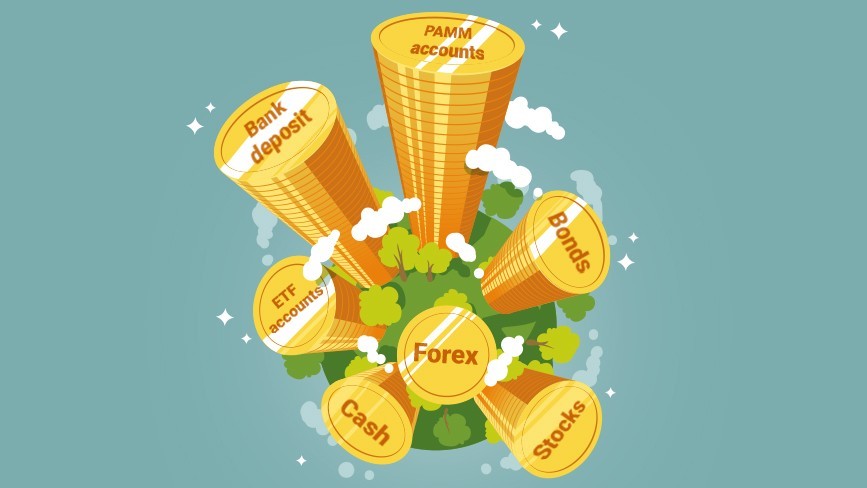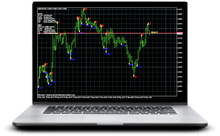7 options to make your money work for you
Information is not investment advice

People say that money is not supposed to be simply saved. It is believed that the best way to control your money is to invest it and make it work for you in the future. But what can you invest in? There are many options to choose from. Choose yours to be sure that your money is safe and sound!
What is investing?
To begin with, investing is distributing your money to get further profit out of it. For example, if you lend your friend money and he returns the debt a year later – say, $110 instead of the borrowed $100, that means you technically invested in your friend with 10% per annum.
You don't need any specific knowledge to start investing. It seems hard, but all you need is a more or less clear idea of what you want to do with your money and what are the possible options. Investments are none of a sacred financial science – just basics for people who care about their savings.
The most popular ways of investing money are real estate and, well, cash – but this is the situation when the most popular doesn’t equal the best. Let’s go through some options you can choose to invest your funds.
What are the options?

Cash
Some people still believe that saving money in stacks hidden under the bedroom floor is a valid option. Basically, it is, but there are several points to remember if that’s your option of choice. Firstly, you have too easy access to the money, so the temptation to take just a little bit for extra spends is harder to resist. And secondly, remember the inflation: at some point, you might find your savings worth less than you expected.

Fixed bank deposit
You deposit your money in a bank with a particular interest rate per annum. Each country and each bank have their initial deposit, deposit tenure, and the percentage you're getting.
This option is quite easy and safe, however not very profitable – usually, the interest rate is less than 1% per annum. Bank deposits can save you from spending too much, but won't become a source of passive income.

Bonds
Remember the example where you lend your money to a friend and get more in a year? It works a similar way. But instead of a friend, you are lending money to the government, or a region, or a company. You know for sure when you're going to get your money back, and what percentage you’re getting above the sum you gave.
There are also Eurobonds, which are denominated not in the national currency of the country that issued them. Eurobonds are issued in a currency that is foreign for both the issuing and buying side.
Bonds are slightly less risky than the stocks and are long-term as well. Usually, the government sells the bonds to the banks or other financial companies to then distribute them to investors. The profitability depends on many factors, but all in all, it's not a tremendous financial breakout as well.

Forex trading
Yes, Forex is not only the way to earn your first million; it is also a way to keep your money rotating. With FBS, you can enter the financial market and multiply your investments. It’s free to open the account. FBS works according to CyCES license, so the conditions here are transparent and meet all the highest standards.
Start with a demo account or move on with the real one if you’re feeling fully ready. The initial deposit for real account is €10.
Trading on Forex is riskier than simply putting your money in a bank or buying dons, but the whole point is that you’re risking for much bigger reward. In case of Forex, you might get not 5%, but 50%, 100% and more per annum. With risk management, you get a chance to multiply your initial deposit significantly.

Stocks
Stocks slightly remind the bonds in their mechanism. You buy a small part of a company shares (or maybe not that small, depends on your abilities) and get the dividends from it as a shareholder.
As long as the company does good, the stocks go up; whenever the business has a slide down, the stocks get cheaper. Stocks are usually quite affordable price-wise, but remember that the less you invest, the higher might the broker’s commission be. Plus, stocks are quite risky. When the situation is stable for the company, it means the stocks are traded on the average level. The best time to buy stocks are when they are low, but be sure they don't go lower.

PAMM accounts
PAMM (Percentage allocation management module) accounts are for those who are not that good in trading or simply want to be more of an investor rather than an active trader. A broker gives a shared account with a mutual fund, where an investor is putting their money for a trader to do the trading job on the market. A trader can't withdraw the funds without investor's approval, and investor can't trade without a trader.
There can be more than one manager, trader, and investor – it can be the whole team, but in that case, it just gets more complicated and is called Open-end-funds. Open-end-funds are a collective form of an investment when you gather several people's funds for a mutual one to create a more impressive portfolio.

ETF accounts
An exchange-traded fund or ETF is traded on the stock exchange and allows people to buy or sell it through brokers. ETF is a good opportunity to hedge risks, because the ETF consists of a mix of stocks, bonds and other instruments. One ETF can hold several stocks of large companies.
ETFs are tightly linked to the major indices such as Dow Johns Industrial Average, S&P500 and others. ETF is more profitable than individual stocks or PAMM accounts, but is more suitable for experienced investors. This is a great way to diverse your portfolio.

What you SHOULD NOT invest in
Binary options and financial pyramids are a no-no for anyone who respects the money they worked for. This is the bad company you’re not supposed to hang out with. Usually, they seem quite tempting, because of the sums you might get – but the risks are too high.
The winner takes it all or loses more than they were ready to lose. The losing option is a 100 times more possible outcome, so save your money and nerves.

Head over heels with investing
Investing is not as easy as ABC, but also is no rocket science. Once you get to know your options, you can choose whatever suits your lifestyle more and watch your money working for you. Investing, however complicated it might look on the first sight, is a basic thing for everyone who takes their money seriously. And once you take your money seriously, you get serious money – it’s all about the attitude!




